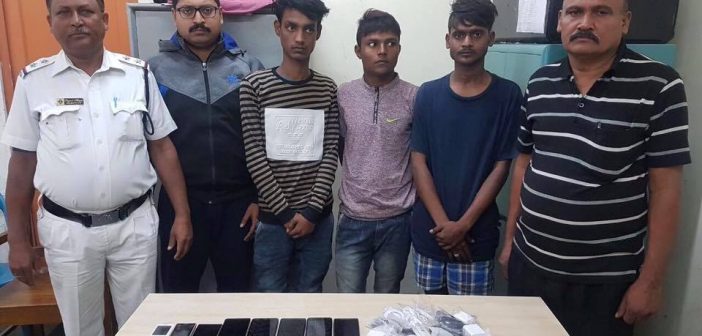In the bustling streets of India’s cities and towns, a silent crime wave is sweeping the nation. Mobile phone thefts have skyrocketed, leaving victims not only financially burdened but also increasingly disillusioned with a law enforcement system that seems either incapable or unwilling to stem the tide. Despite the ubiquity of modern technology, police forces across India are struggling to recover stolen phones, allowing thieves to operate with brazen impunity.
Grim Statistics and Growing Frustration
The numbers paint a bleak picture. Reports suggest that cell phone thefts in Bengaluru, a major technology hub, shot up a staggering 450% in 2022 alone. In Delhi, the nation’s capital, the situation is no better. Official data reveals that tens of thousands of phones are snatched or stolen annually, often at knifepoint, with recovery rates remaining abysmally low.
“I went to the police station, filed a report, but they practically laughed, saying they couldn’t do anything,” recounts Neha Singh, a victim of phone theft in Mumbai. Her story echoes the experiences of countless others who feel let down by a system that seems more interested in brushing aside their concerns than taking decisive action.
Technology: A Double-Edged Sword
While technology has revolutionized many aspects of our lives, it has also provided new tools and methods for criminals. Geolocation apps, meant for tracking lost devices, are often disabled by savvy thieves within minutes of a theft. Even IMEI (International Mobile Equipment Identity) numbers, unique identifiers for every phone, can be manipulated, hindering tracking efforts.
Moreover, online marketplaces and second-hand shops have created a thriving underground economy for stolen phones. Devices are often swiftly stripped of their data, refurbished, and resold to unsuspecting buyers, making tracing them a complex and time-consuming process.
The Police Response: Overburdened or Indifferent?
Law enforcement agencies cite a number of reasons for their inability to recover stolen phones. Investigating individual phone thefts, they argue, is resource-intensive and often yields limited results due to the sophisticated tactics of criminal networks. Police departments, already stretched thin dealing with violent crimes, prioritize cases with higher social impact.
However, critics counter that the police’s approach to mobile phone thefts often reflects a deeper apathy towards these crimes. Victims are routinely discouraged from pursuing cases, their complaints dismissed as trivial in comparison to more serious offenses. This lack of urgency creates an environment where thieves feel emboldened, knowing the chances of being caught are slim.
Consequences Beyond Financial Loss
The impact of phone theft extends far beyond the immediate financial loss. Stolen phones often contain priceless personal data, including photos, videos, contacts, and sensitive financial information. This data can be exploited for identity theft, blackmail, or other nefarious purposes, leaving victims feeling violated and traumatized.
For many, especially those who rely on their smartphones for work, education, or staying connected with loved ones, a stolen phone disrupts daily life significantly. The process of replacing a device, restoring data (as much as possible), and adjusting to the loss can be both emotionally and financially draining.
The Need for a Concerted Response
Tackling the escalating problem of mobile phone theft in India requires a multi-faceted approach. Here’s where change is needed:
- Enhanced Police Focus: Law enforcement agencies need to dedicate resources specifically to investigating phone theft cases. Creating specialized cybercrime units, trained in tracking stolen devices and dismantling criminal networks, is essential.
- Public Awareness Campaigns: Educating citizens about theft prevention strategies – like avoiding using phones in crowded areas, installing security apps, and being vigilant – can act as a crucial first line of defense.
- Regulation of Second-Hand Markets: Stricter monitoring and regulation of online marketplaces and second-hand shops are needed to make it harder for criminals to sell stolen phones. Implementing mandatory ID checks and a record-keeping system for transactions can help.
- Tech Sector Collaboration: Smartphone manufacturers and app developers should collaborate with law enforcement agencies to develop more robust anti-theft measures. Implementing ‘kill switches’ that remotely disable stolen devices and harder-to-bypass security features could deter thieves.
Hope Remains: Initiatives and Innovations Lighting the Path
Despite the challenges, several positive developments offer a glimmer of hope. The Central Equipment Identity Register (CEIR), a government initiative launched in 2019, allows users to report stolen phones and have their IMEI numbers blacklisted, rendering the device unusable on any Indian network. While its impact is still being assessed, it represents a step towards nationwide coordination in combating phone theft.
Additionally, private companies have begun offering device insurance and recovery services, offering some respite to phone owners. These services often employ advanced tracking software and work with law enforcement to increase recovery chances. However, access to these services remains limited, particularly for low-income individuals who are often targeted by phone thieves.
Ultimately, a holistic approach is crucial. Public-private partnerships, coupled with continued innovation in technology and a shift in police priorities, are essential to combat the growing menace of mobile phone theft. Only by addressing this issue effectively can India ensure its citizens feel secure while using their mobile devices, not fearing them becoming a target for criminals and a source of frustration in their fight for justice.
Beyond Statistics: A Call to Action
The plight of Neha Singh and countless others like her is a stark reminder of the human cost of phone theft. It’s not just about stolen devices; it’s about the violation of privacy, the disruption of life, and the erosion of trust in the very institutions that are meant to protect us.
As India strives to become a global economic powerhouse, it cannot afford to neglect the concerns of its citizens grappling with this everyday dilemma. The fight against phone theft requires not just an acknowledgement of the problem but also a commitment from all stakeholders – citizens, police, policymakers, and the tech industry – to work together in creating a safer digital landscape for everyone.
Only then can the hope of a society free from the fear of having their most personal possessions vanish into thin air become a reality.





